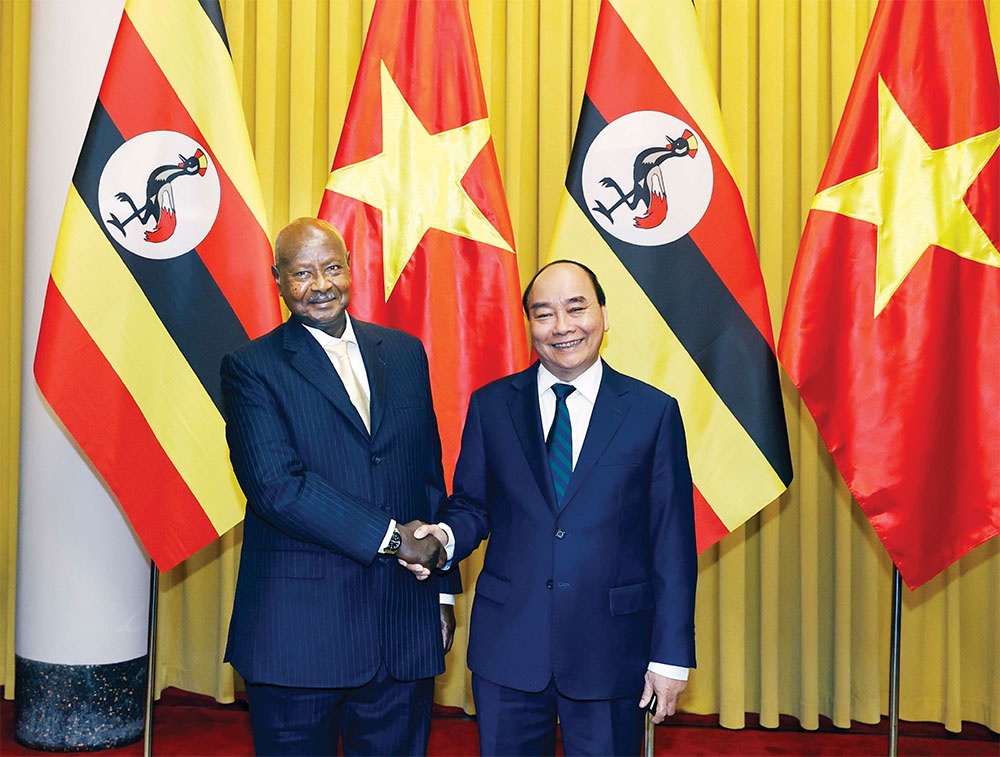Uganda leads African charge into Vietnam
Both nations have inked four cooperation agreements on diplomacy, education, ICT, and agriculture. They also agreed on a plan to boost negotiations and then inking of other agreements on investment protection, taxation, and others which will facilitate economic and trade cooperation in the future.
Vietnam and the East African nation have also agreed to expand bilateral ties in many other sectors such as education and training, IT, defence and security, healthcare, tourism, and vaccine research and production.
One of the most important points during the visit is that both countries have agreed to further intensify agricultural cooperation, with a focus laid on food production, which will help ensure national food security and is considered a key cooperation pillar.
 |
| Vietnamese State President Nguyen Xuan Phuc (right) met with Ugandan President Yoweri Kaguta Museveni, photo VNA |
Investors consider Uganda’s agricultural potential to be among the best in Africa, with low temperature variability, fertile soils, and two rainy seasons over much of the country, leading to multiple crop harvests per year.
According to the UN’s Food and Agriculture Organization, Uganda’s fertile agricultural land has the potential to feed 200 million people. Eighty per cent of Uganda’s land is arable, but only 35 per cent is being cultivated. In fiscal year 2021-2022, agriculture accounted for about 24.1 per cent of GDP, and 33 per cent of export earnings. It is estimated that about 70 per cent of Uganda’s working population is employed in agriculture.
Meanwhile, since the doi moi economic reform in the 1980s, Vietnam has transformed from being a nation heavily affected by food shortage to one of the world’s leading producers and exporters of many agricultural products, such as coffee, peanuts, and rice. While the GDP share of the agriculture sector has been decreasing in recent years due to Vietnam’s shift towards a service and industrial economy, the GDP value of this sector has been growing steadily. In addition, agriculture has been the largest employer across economic sectors in Vietnam, employing around 18 million Vietnamese now.
Vietnam appointed King Ceasor Augustus Mulenga, a Ugandan citizen, as its honorary consul in Uganda in 2017. Last week Mulenga highlighted the strong Vietnamese economy. “One of Vietnam’s biggest markets is the United States, and they export their products every year worth $77 billion. They export to China goods worth $49.4 billion. They are exporting to Japan goods worth $20.4 billion. In South Korea, it is $19.6 billion.” Mulenga said. “These are the results that Uganda can learn from, including how the Vietnamese economy has developed strongly.”
According to Ugandan State Minister for Trade Harriet Ntabazi, both countries are seeking ways to boost bilateral economic ties.
“We are going to focus on key priorities of the two economies. They have a shared experience, especially in terms of the products we engage in most, such as agriculture, ICT, and education. We are studying from each other and the way of doing things,” Ntabazi said.
Vietnam and Uganda last week also held their first ever business summit and exhibition in Hanoi to provide a platform for networking and sharing trade opportunities. It helped identify strategies in which Uganda can position its products in the Vietnamese market; highlight high-priority sectors for development investment opportunities of mutual benefit for the two countries; and to attract potential investors and joint partnerships between Uganda’s private sector players and Vietnam.
“We expect that the event will help increase investment in agro-processing and manufacturing, which will in turn lead to increased exports for especially coffee, cotton, and horticulture both in value and volume,” said Hope Waira, senior investment executive at the Uganda Investment Authority. “It is also expected that there will be a rise in investments in finance services, ICT, and tourism between the two countries.”
According to the Vietnamese Ministry of Foreign Affairs, the two countries’ bilateral trade reached $14.3 million last year, up 39.8 per cent on-year. Vietnam mainly exports steel, garments and textiles, machinery, equipment and spare parts, phones and components to Uganda, while also importing from the land-locked nation animal feed and materials, coffee, and wood and timber products.
As of October 20, Uganda had three projects worth $90,000 in Ho Chi Minh City across wholesale, retail, cars, and motorbike repairs. Meanwhile, Vietnam has two mining and construction ventures in Uganda – Ba Dinh Construction and Investment JSC is exploiting and processing gold and coloured metals with total capital of $35 million; and ATAD Steel Structure Corporation is engaging in construction, registered at $500,000.
What the stars mean:
★ Poor ★ ★ Promising ★★★ Good ★★★★ Very good ★★★★★ Exceptional
Related Contents
Latest News
More News
- France supports Vietnam’s growing role in international arena: French Ambassador (January 25, 2026 | 10:11)
- Foreign leaders extend congratulations to Party General Secretary To Lam (January 25, 2026 | 10:01)
- Russian President congratulates Vietnamese Party leader during phone talks (January 25, 2026 | 09:58)
- Worldwide congratulations underscore confidence in Vietnam’s 14th Party Congress (January 23, 2026 | 09:02)
- Political parties, organisations, int’l friends send congratulations to 14th National Party Congress (January 22, 2026 | 09:33)
- 14th National Party Congress: Japanese media highlight Vietnam’s growth targets (January 21, 2026 | 09:46)
- 14th National Party Congress: Driving force for Vietnam to continue renewal, innovation, breakthroughs (January 21, 2026 | 09:42)
- Vietnam remains spiritual support for progressive forces: Colombian party leader (January 21, 2026 | 08:00)
- Int'l media provides large coverage of 14th National Party Congress's first working day (January 20, 2026 | 09:09)
- Vietnamese firms win top honours at ASEAN Digital Awards (January 16, 2026 | 16:45)

 Tag:
Tag:
















 Mobile Version
Mobile Version